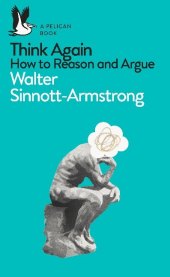 Neuerscheinungen 2018Stand: 2020-02-01 |
Schnellsuche
ISBN/Stichwort/Autor
|
Herderstraße 10
10625 Berlin
Tel.: 030 315 714 16
Fax 030 315 714 14
info@buchspektrum.de |

Walter Sinnott-Armstrong
Think Again
How to Reason and Argue
2018. 304 S. 181 mm
Verlag/Jahr: PENGUIN UK; PELICAN 2018
ISBN: 0-14-198311-6 (0141983116)
Neue ISBN: 978-0-14-198311-0 (9780141983110)
Preis und Lieferzeit: Bitte klicken
A masterclass in persuasion from the inspiring philosopher who has taught a million people to argue through his popular open online course
Our personal and political worlds are rife with arguments and disagreements, some of them petty and vitriolic. The inability to compromise and understand the other side is widespread today. What can we do to change this? In Think Again philosopher Walter Sinnott-Armstrong draws on a long tradition of logic to show why we should stop focusing on winning arguments and instead argue in a more constructive way.
Based on a hugely popular online course with more than a million followers around the world, Think Again explains how to analyse, evaluate and make better arguments while also spotting bad reasoning and avoiding certain fallacies. Through lively, practical examples from everyday life, politics and popular culture, Walter Sinnott-Armstrong offers brilliantly straightforward, wise advice that we can all use at work, at home and online.
It has never been more important to spread an understanding of how to reason than it is today. Think Again is a clear and readable guide to reasoning and argument, filled with relevant contemporary examples. I hope it will be widely read Peter Singer, author of Practical Ethics
Sinnott-Armstrong, Walter
Walter Sinnott-Armstrong is the Chauncey Stillman Professor of Practical Ethics in the Department of Philosophy and the Kenan Institute for Ethics at Duke University. His class, Think Again: How to Reason and Argue, is one of the most popular courses available online via the global platform Coursera. His books include Morality Without God? and Moral Skepticisms.


